Facing a denied rehab insurance claim can be a frustrating and disheartening experience. However, there are steps you can take to navigate the situation and increase your chances of obtaining the coverage you need for substance abuse treatment in Texas. Alamo Behavioral Health will show you how to prepare so you can advocate for your rights and potentially overturn the denial.
Reviewing the Rehab Insurance Claim Denial
When faced with a denied coverage for addiction treatment claim, it is crucial to carefully review the denial letter and understand the reasons provided by the insurance company. By doing so, you can gain insight into the specific grounds for denial and evaluate the situation more effectively.

Request a copy of the denial letter from your insurance company. This letter outlines the reasons for the denial and provides essential information for your appeal. Take the time to read it thoroughly, ensuring you understand the insurer’s justification for denying coverage. Pay close attention to any specific policy provisions, guidelines, or medical necessity criteria mentioned in the denial letter.
Take the opportunity to familiarize yourself with the coverage provisions and guidelines outlined in your health insurance policy. This will help you evaluate whether the denial aligns with the terms of your policy. Examine the policy to determine any limitations, exclusions, or requirements related to rehab services. Understanding these provisions will allow you to identify potential discrepancies between the denial and the policy’s terms.
Appealing the Denied Claim
When faced with a denied Aetna rehab coverage or any other coverage claim, appealing the decision can be crucial in pursuing the coverage you deserve. Here is how to prepare for filing your appeal:
- Gather the necessary documentation
- Talk to your insurance provider
- File an appeal
Gather Relevant Documentation
Collect all relevant documents that support your case for the necessity of rehab services. This may include:
- medical records
- treatment plans
- diagnostic tests
- prescriptions
- other pertinent information
The goal is to compile a comprehensive package that substantiates the medical necessity of the recommended rehab services and demonstrates that they align with your insurance policy’s coverage provisions.
Initiate Contact with the Insurance Company
Initiate contact with your insurance company’s customer service department to discuss the denial and obtain further clarification. By speaking directly with a representative, you can gain insights into the specific reasons for the denial and any additional information or documentation that may be required for your appeal. Whether you are appealing to Humana rehab coverage denial or filing an appeal with another provider, this record of contact can be valuable.

File an Appeal
Follow the insurance company’s designated procedures for filing an appeal. Pay attention to any specific forms or documentation required. Submitting your appeal within the timeframe outlined in your insurance policy is crucial. Missing the deadline could result in the denial becoming final and binding.
Finally, you must be well-organized and diligent in providing any additional information requested by the insurer during the appeal process.
Seeking Professional Assistance when Appealing a Denied Rehab Insurance Claim
When dealing with a denied rehab insurance claim, seeking professional assistance can be beneficial in navigating the appeal process and increasing the chances of a favorable outcome. Here are two avenues to consider when seeking professional assistance:
- Your healthcare provider
- Legal assistance
Consult with a Healthcare Provider
Engaging with a healthcare provider, such as your primary care physician or the healthcare professional responsible for recommending the rehab services, can provide valuable support during the appeals process. They can offer insights into the medical necessity of the recommended services, write letters of medical necessity, and provide additional documentation to strengthen your case.
Seek Legal Advice
Consulting with an attorney specializing in healthcare or insurance law can provide valuable guidance in complex cases or if you encounter challenges in the appeal process. They can review your case, analyze the insurance policy and denial reasons, and offer legal advice on how to proceed.
Legal representation can be particularly beneficial if the denied claim involves significant financial implications or if you suspect any violations of your rights under insurance regulations. An attorney can help protect your interests and advocate for the coverage you deserve.
Documenting Everything While Appealing to Denied Rehab Insurance Claim
When dealing with a denied insurance claim, whether UMR rehab coverage, Humana, Cigna, or any other, maintaining detailed records and documentation is essential. Keeping organized and thorough documentation helps strengthen your case during the appeals process and ensures that you have a clear record of all communication and important events. Key points to consider when documenting everything are:
- Keeping detailed records
- Maintaining a chronological timeline
- Recording conversations
Keep Detailed Records
Create a file or folder specifically dedicated to your denied claim. Keep all relevant documents, including:
- the denial letter
- insurance policy documents
- correspondence with the insurance company
- appeal letters
- medical records
- treatment plans
- other relevant information
Organize the documents in a logical order, making it easy to find and reference specific pieces of information when needed.
Maintain a Chronological Timeline
Create a timeline that chronicles the sequence of events related to your denied claim, whether it’s Cigna rehab coverage or UMR coverage, or any other provider. Include dates, times, and summaries of all interactions with the insurance company, healthcare providers, and any other relevant parties. Note important milestones such as appeal submission dates, deadlines, and any outcomes or decisions made throughout the process.
Record Conversations
Whenever you communicate with the insurance company, healthcare providers, or any other relevant parties, take detailed notes of the conversations. Include the names of the individuals you spoke with, their job titles, contact information, and a summary of the key points discussed. Note any specific instructions, requests for documentation, or promises made during the conversation.

Maintaining detailed records and documentation serves multiple purposes:
- It helps you stay organized and have easy access to all relevant information during the appeals process
- It provides a strong foundation for building your case, as you can refer back to specific documents and conversations to support your arguments
- In the event that you require legal assistance, having well-documented records can provide crucial evidence to support your claim
Exploring Alternative Rehab Funding Options
If you encounter a denied rehab insurance claim, exploring alternative funding options can help you access the necessary treatment and support. While alternative funding options may not fully cover the cost of the rehab services, they can help offset some expenses and make the treatment more affordable. It is worth considering these options in conjunction with appealing the denied claim to maximize your chances of obtaining financial assistance. You can consider:
- Nonprofit or charitable organizations
- State and local resources
Nonprofit and Charitable Organizations
Research and reach out to nonprofit organizations or charitable foundations that offer financial assistance for rehab services. These organizations may provide grants, scholarships, or other forms of financial aid to individuals who face financial barriers to accessing necessary treatments. Exploring these resources can help alleviate the financial burden and ensure you receive the care you need.
State and Local Resources
Investigate state and local programs or resources that offer assistance for rehab services. Some government-funded programs, community initiatives, or social services may provide financial support or help navigate the insurance appeals process. These programs may vary depending on your location, so researching available resources in your area is worth researching.
Navigating Denied Rehab Insurance Claims: Strategies for Taking Action and Seeking Resolution
With the right knowledge, you can take a proactive approach to address a denied rehab insurance claim. While the process may be challenging, persistence, thoroughness, and professional assistance can increase your chances of successfully overturning the denial and obtaining the coverage you need for rehab services.





